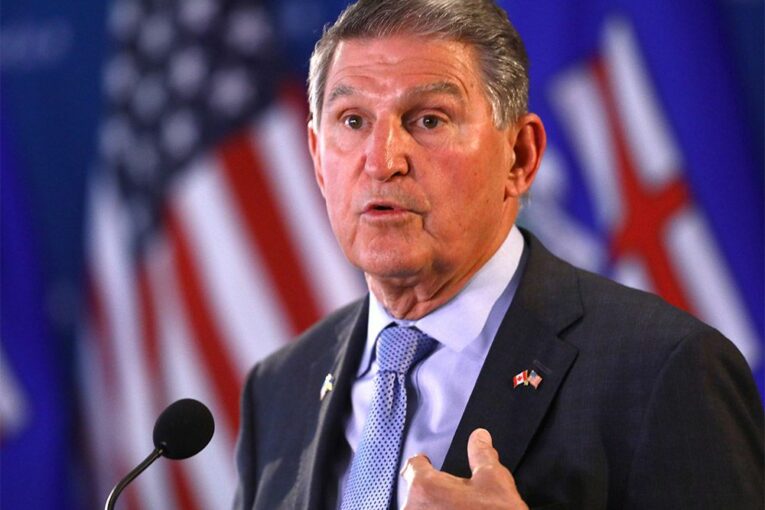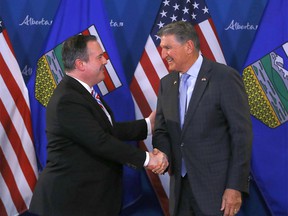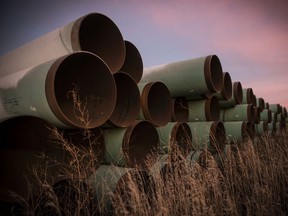
[ad_1]
Joe Manchin came to Alberta and the oilsands this week, focused on the future of energy security in North America.
So senator, how about that Keystone XL pipeline?
“It didn’t come up because it’s a sore point for both sides,” Manchin told reporters Tuesday when asked about the now-defunct project to ship more Canadian crude to the massive refining hub along the U.S. Gulf Coast.
“The XL pipeline is something we should have never abandoned. Now, we wish we had it.”
Manchin, who chairs the U.S. Senate Committee on Energy and Natural Resources, sat down with Premier Jason Kenney and a number of oilpatch CEOs at McDougall Centre on Tuesday as part of a trip to Alberta.
The visit to Calgary by the Democratic senator from West Virginia came after he journeyed to two oilsands sites near Fort McMurray on Monday, taking a helicopter tour of Suncor Energy’s facilities and visiting Cenovus Energy’s Christina Lake thermal oilsands project.
The two sides talked about the commitment of oilsands producers to reach net-zero emissions by 2050, and the development of critical minerals in the province, said Energy Minister Sonya Savage.
Much of Tuesday’s discussion was focused on the assets both countries can bring to the table as western countries look to shore up energy security following the invasion of Ukraine by Russia, the world’s largest oil and gas exporter.
Canada has the world’s third-largest reserves. The U.S. is the largest oil producer, and in December it became the top global exporter of LNG.
Manchin hit the right notes for the Alberta audience. He touted the low emissions from Canadian natural gas production and the positive relationship between the two countries.
Kenney and Manchin are talking about building a North American energy and climate consortium.
“There shouldn’t be a barrier because we have a border,” the senator said. “That border should be invisible when it comes to the energy and the climate and the responsibilities we have as citizens on this earth.”
The premier noted he has been asked by Manchin to speak to the U.S. Senate committee about continental energy security concerns.

ATCO chief executive Nancy Southern, who attended the energy roundtable, was struck by Manchin’s knowledge of Canada’s oil and gas resources.
“Senator Manchin is saying he doesn’t understand why we don’t have a North American approach to energy, which was music to everyone’s ears in the meeting,” she said.
Manchin’s visit is another signal of how central the discussion about energy security has become as prices soar and European allies seek to pivot away from Russian imports.
The U.S. and Canada have banned Russian oil and gas supplies. Both the Trudeau government and the Biden administration have recently called upon domestic producers to ratchet up output.
Canada is already a dominant supplier of energy to our southern neighbours, providing about 62 per cent of oil imports and 98 per cent of natural gas imports to the U.S., Manchin noted.
Keystone XL, however, never seems far from the debate between the two countries, precisely because it’s become such a sore point for such a long time.
First proposed in 2008, the project proposed by Calgary-based TC Energy would have transported 830,000 barrels per day of oil from Western Canada to the United States.
President Joe Biden cancelled the permit for the cross-border pipeline on his first day in office last year, citing climate concerns. The Alberta government sunk about $1.3 billion into the development to get construction started.
Kenney has mused repeatedly about trying to revive the project, although TC Energy CEO Francois Poirier said last week the Calgary-based company is not interested.
But could the project be restarted in another form?
It doesn’t seem likely at this point, given the tortuous path that faced Keystone XL and the ongoing global focus on decarbonization.
Who would put money into such a venture?
“Basically, the brand of the XL pipeline is probably gone. Can it be rebranded? Can it be rerouted? Can it be different things? We need this product,” said Manchin.
“I can’t guarantee there’s a company up here that wants to reinvest again, or if the administration is going to entertain that, but it’d be foolish not to.”

Ben Cahill, a senior fellow on energy security at the Centre for Strategic and International Studies, said Keystone XL “is dead and it’s not coming back” given the polarization surrounding the project.
Energy economist Peter Tertzakian said although Canada and the United States are major oil producers, neither country is completely energy independent. Foreign crude is imported into eastern Canada, while the U.S. imported 8.5 million barrels per day of oil and petroleum products in January.
Tertzakian said bringing a key policy-maker to Alberta allowed Manchin to see first-hand what work is being done in the oilsands to reduce emissions, allowing him to take updated information back to the U.S.
“A lot of perceptions about the oilsands are from 2008 . . . and those perceptions linger to this day, so we have to shatter those perceptions,” he said.
Gary Doer, Canada’s ambassador to the United States during much of the Keystone XL drama last decade, said Manchin has been a consistent supporter of North American energy co-operation, dating back to his time as governor of West Virginia.
But such visits are useful.
“The bottom line is having a person with a strong voice and a big voice in Washington, that chairs a committee, visiting (Canada) is very helpful,” said Doer.
“He’s got a great knowledge of both traditional energies and clean energies and those are the debates going on in the United States now.”
Christopher Sands, director of the Wilson Centre’s Canada Institute in Washington, said Manchin is a pivotal figure in the U.S. Congress who’s seeking to balance climate action with energy security and affordability issues.
“Politicians in Alberta will have a real opportunity with Senator Manchin to get a sense of where the American debate is going — and where it won’t go.”
At this point, additional energy co-operation seems like a logical place to go in a new era of energy security.
Just don’t expect the road to include a resurrection of Keystone XL.
Chris Varcoe is a Calgary Herald columnist.
More news, fewer ads, faster load time: Get unlimited, ad-lite access to the Calgary Herald, Calgary Sun, National Post and 13 other Canadian news sites for just $14/month or $140/year. Subscribe now through the Calgary Herald or Calgary Sun.
[ad_2]
You can read more of the news on source
